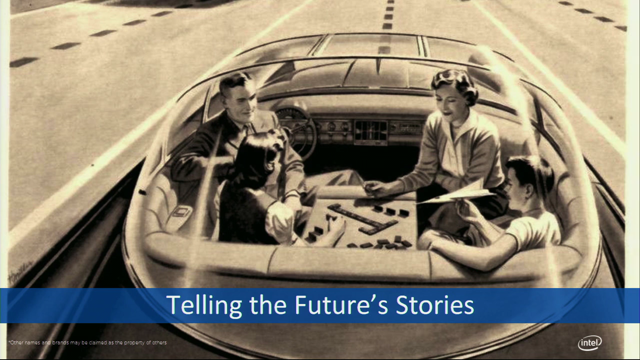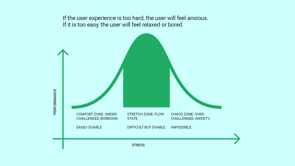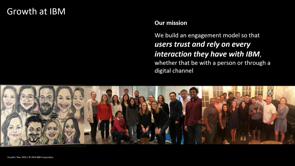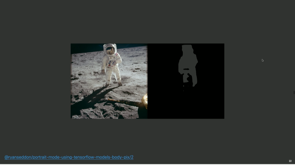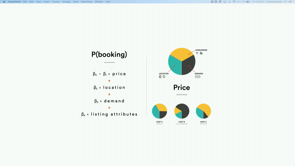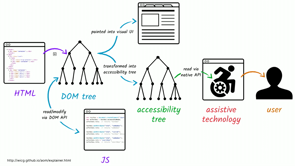
(bouncy instrumental music) - Hello, hello.
I'm really excited to be here.
This is my first time in Sydney, it's my first time in Australia, first time at Web Directions.
I'm not Aaron Swartz, though I do really love Aaron Swartz. (laughs) - [Guy In Audience] I'm so sorry.
- It's okay. (laughing) I hope I can embody the spirit of Aaron Swartz. (everyone laughing) Yes, so, I hope that I can give you some interesting, weird and fun thoughts to stew on as you move on to whatever's next for you here. So my name is Aaron Lewis.
I've been working as a product designer for the last five years, in politics and in technology. I started out working on Hilary Clinton campaign's design team, designing tools for organisers in the field. And for our fundraising team back in the headquarters. And then I worked for a few years at Uber, where I focused mostly on designing tools for hospitals, and healthcare organisations. That allowed them to facilitate non-emergency medical transportation for their patients in bulk. But earlier this year, I decided to take some time off from designing to do some of my own research and writing, and rabbit hole explorations.
I've been focused on these three themes.
Studying the history of media revolutions, from the printing press to our own.
Doing digital anthropology, learning about internet and meme culture, almost like the way an art historian would, and looking at the way it influences IRL culture. And I've been exploring the social psychology of new media. So how these tools end up influencing our perceptions of ourselves and of our world.
So today I wanna talk to you a little bit about some weird things I've learned along this research journey. I started out by writing a guide to the weird internet landscape that we find ourselves in. I called it, "You Can Handle the Post-Truth." I explored the history of deepfakes, the mechanics of dinformation campaigns and meme warfare, the psychology of how people become radicalised online. I learned about the rise of computer-generated influencers, and how they're blurring the line between fact and fiction. There's AIs pretending to be people, and people pretending to be AIs.
I learned about technology that's allowing people to turn themselves into interactive deepfakes. These hyper-realistic VR avatars are like digital souls that live on after your physical body passes away. And your appearance could be used for generations. These tools sort of blur the line between life and death by promising us the appearance of immortality. And I learned about faith leaders who are working with digital souls on the web in new ways.
Baptising people in virtual reality, and forming churches in the digital realm.
So this Oculus ad, I think, sort of sums up the big mood pretty well.
The tag line is define your own reality.
The 2019 internet feels sort of surreal, because we're dealing with so many different competing versions of the truth, and what is real. So, the big take-away here is that new media tech is making us almost god-like in our ability to reshape people's realities.
As you can see, I slid really, really quickly from questions that are more political about fake news, to questions that are sort of philosophical, or almost even theological.
How do people distinguish between true and false, how do they form beliefs in a media environment where it's hard to tell what's real and what's fake. Surprisingly, this research started reminding of a bunch of questions that I was exposed to as a kid. I grew up in a very conservative, Christian home where I was taught to believe in God.
And answers to these complicated questions of post-truth were pretty simple, it's sort of whatever is in the book. When I got older, I rebelled against my religious beliefs as many teenagers do, and became pretty convinced that we don't need god concepts or myths to make sense of the world.
We could understand everything in scientific, technical terms.
But as I've been doing this research into internet culture, I discovered that people have started to use new metaphors to talk about god-like phenomenon.
Metaphors that are more palatable to my secular, rational mind.
Metaphors that try to describe this bizarre, sort of otherworldly tech landscape that we're embedded in. So, today I wanna take you through seven god metaphors in the digital pantheon of 2019.
But first before we do that, let's talk for a quick sec about what is metaphor, and why I think it's so important. Growing up, I was taught to think that metaphor is a sort of flowery, unnecessary element of language or poetry. A sort of like rhetorical flourish that you can take or leave.
But a metaphor is way more than that.
My favourite cognitive scientist and linguist, George Lakoff, he teaches us that metaphor is really at the core of how we make sense of the world. It shapes how we communicate, how we think, and how we act. The essence of metaphor is understanding one thing in terms of another.
Without this cognitive trick, it would be basically impossible to learn about new things, or navigate a complex world.
We rely really heavily on metaphor in computing, and in interaction design.
Designers are almost like metaphor manipulators. This here is one of the earliest graphical user interfaces from the 80s, and though it seems really obvious to us now, the GUI was a really novel invention that was based entirely on metaphors from the physical world. It made computers understandable to normal, everyday people because it gave them the illusion that they were interacting with things that they were familiar with, from their physical environments.
These concepts are so baked in to our everyday digital lives nowadays, that we barely even recognise them as metaphors borrowed from the physical world. But things like buttons to windows, or a portal that give us a view into the web, file systems and folders, the trash can.
The idea of the web being a page that you can manipulate with your hand.
This is my favourite one, the idea of cut, copy and paste, sort of descendant from old manuscript culture where scribes would actually have to psychically cut up a manuscript and re-paste the text in a different place, to actually move text around.
Even the concept of an interface was a metaphor that had to be dreamed up.
The idea that interaction between a human and computer could almost be like an interaction between two faces, or two people.
And the metaphors that we use heavily influence users ideas about what's possible.
Metaphors are what allows us to climb up the ladder of abstraction, escape the realm of the assembly code, and ones and zeros. Without metaphors we'd be stuck using interfaces like this. Metaphors help us navigate our devices, and our complex world.
They help us wrap our mind around things, that would otherwise be totally unintelligible. This is true for interfaces, and it's also true for the larger, complex tech systems that we're embedded in. Okay, now that we see why metaphors are so vital to the way we understand the world, let's zoom out again and begin our tour, our grand tour of the pantheon of 2019, and explore these seven different metaphors that we believe by.
First up in our tour is the Human Colossus. This god was named by the popular blog Wait But Why, and it helps us imagine all eight billion humans as a sort of single, super organism.
It's inspired by the Colossus of Rhodes, which is an ancient Greek statue that honour their sun god Helios, after they experience victory in war.
The statue was over 100 feet tall, and it later inspired the French designers of the Statue of Liberty.
Wait But Why imagines, or re-imagines the colossus as a giant person sitting on top of a giant computer. And each one of us is like a little cell in this body. In the distant past, we lived in relatively isolated tribes. There were always people who were travelling, and exploring, and connecting people across different cultures. But for the most part, people were generally pretty disconnected from one another.
We spent the last few hundred years building a sprawling communications network that connects billions of people together.
Ships, trains, telegraphs, phones, radio, television, now the internet.
We live in this globalised interconnected world where instantaneous information transfer is the new normal. We've summoned the Human Colossus with our reverence for financial profits and knowledge accumulation, and it's growing faster every year.
The better we could communicate on a mass scale, the more the whole species begins to function like a single organism, with humanity's collective knowledge tower as its brain, and each individual acting as like a little cell or nerve cell in the body.
And the Human Colossus began inventing things that no human could have dreamed of inventing on their own. If an individual's core motivation is to pass their genes on, we could almost say that the Human Colossus's core motivation is to keep on creating value, which means it tends to invent newer and better technology. So, the Human Colossus has made the world more open and connected.
And it's brought us many amazing innovations, but it remains to be seen whether we'll regret summoning it, 'cause it's also brought us to the brink of an ecological crisis.
This here is a mind-blowing visualisation to me of the colossus, it's just a really good visualisation of how connected we are.
It's 24 hours of global Twitter data.
We've definitely come a long way from those first ships. Next up is Moloch, the god of coordination failure. Moloch was originally a biblical deity who demanded very costly sacrifices from his followers. He's appeared in religious texts and English literature throughout the ages. Everything from John Milton's Paradise Lost, to Allen Ginsberg, Howl, in the 20th Century. Most recently, he was brought back to life by the blog Slate Star Codex, in a internet famous essay called Mediations on Moloch. Moloch is behind a wide variety of intractable coordination problems.
Everything from climate change, to the prisoner's dilemma, to overfishing, to arms races, and government corruption. He shows up again and again throughout history. The pattern is that whenever there's a competition over something, it could be anything, the opportunity arises to throw human value under the bus in order to get more of that thing.
Those who take the opportunity prosper, those who don't die out.
And the process continues over and over again until all values that can be traded off have been. In other words, until we can't really figure out any way to many any things worse.
So the implicit question here is if everyone doesn't like the current system, then who perpetuates it? And the answer to that in Slate Star Codex is Moloch. The concept is powerful, not because it's correct. Of course there's not a literal giant bull that causes all these problems.
But personifying the system helps us understand the extent to which it's outside of our control. A classic example of a problem caused by Moloch is nuclear arms race where, of course, everyone would prefer that no one has nuclear weapons, but everyone's afraid that everyone else is gonna start building them.
And so we end up in a situation where everyone has them, even though most people would prefer that they didn't exist. What's particularly scary about Moloch is that, it seems to force humans into coordination problems against their will.
He's widely feared by rationalist circles all across the internet.
I even heard Vitalik, who created Ethereum, referred to him as the rationalist god of coordination failure.
And he inspires many blockchain fans to create new technologies that might improve human coordination. Techno-optomists who worship the Human Colossus sometimes believe they'll be able to tame Moloch, but others aren't so sure.
Next up is the Uruk Machine, the god of heartless market forces.
The Uruk machine gets its name from the Uruk period, which was one of the, it was the largest city in the world in 3000 B.C. It had almost 80,000 people, complete with a military system, a full on class structure. And it was the product of a period of mass urbanisation from the countryside, not unlike the industrial revolution of the 1800s. A few years ago, a blogger named Lou Keep named a god after this city.
The Uruk Machine represents what happens when market forces collide with preindustrial social systems.
The Uruk Machine has sort of authoritarian impulses, and it seems incapable of caring about lifestyles, and rituals that don't add value to the economy. He likes the term chaotic messiness into coherent order that can be exploited, and it often leaves social unrest wherever it goes.
Essentially, the pattern plays out throughout history like this.
There are smaller groups who have highly efficient, but very localised forms of doing the thing. They encode that knowledge in myths or stories, which is then passed down from generation to generation, in a sort of mnemonic technology.
When a larger entity comes in and tries to subsume it, it basically bulldozes over these local social rituals that were developed.
And the power is weighted really heavily towards the larger unit, because these local community explanations are basically irrational, or they appear irrational or unintelligible to the larger force.
A classic prototypical example of the Uruk Machine is what happened when the European colonists came over and collided with the indigenous people in America.
The Native American people, they tried to make deals with the colonists.
Sometimes the colonists tried to buy or purchase their land, their property.
But often the Native American people didn't even have the concept of private property. They attributed more weight to the oral word, to verbal agreements than the written word and the legal system of the Europeans.
So the social system and rituals of the indigenous people were basically illegible or invisible to the market. This is another example of the Uruk machine I love. It's Le Corbusier's plan to redesign Paris. He's an architect in the 20th century.
He basically wanted to turn everything into this really neat grid, and bulldoze over the sort of organic beauty. So in its quest to measure and optimise for a very specific type of economic productivity, the Uruk machine bulldozes over traditional cultural practises at the expense of our emotional well-being. And the better it gets at collapsing these social relations, the bigger it grows.
So today, we're left with a lot of damage that this god has left in its wake, like widespread loneliness and lots of disconnection from community.
It sort of created this intense feedback loop, like Moloch. We participate in it, even though it seems we can't control it.
Next up is The Stack, the god of systems thinking. This is by far the most academic god in our pantheon. It comes straight out of MIT, from a design theorist and political philosopher named Benjamin Bratton. The Stack is sort off a framework to understand modern geo-politics.
In the 21st century, we're pretty accustomed to seeing 2D maps that show earth's territory divided into little jigsaw puzzle pieces that represents all of our countries.
But nowadays as we've seen in the past few years, with Facebook and Google, tech companies often have as much or more political power than nation states. And they are traditional, their roles and responsibilities often transcend traditional geographic boundaries. So the idea with The Stack is represent how geo-politics and power actually work in the 21st century, in this sort of 3D mega-structure. The idea is that it's made up of six different layers, earth, which is of course the land that makes up the raw materials that we use to make our devices.
Cloud, which is the servers and all the infrastructure that powers our technology.
City is sort of smart cities of the future. Address can be anything from an IP address to the address of a home basically locating things in physical space.
The interface is how people interact with The Stack, and a user might be anything from me using my phone, to a self-driving car that plugs into the interface. So, unlike the Human Colossus, The Stack is sort of a theory of governance that explores how our political systems might co-evolve with technology in the near future.
Whereas the other gods aren't subject to our will, Benjamin Bratton believes that eventually we'll be able to control The Stack.
He claims it's a sort of neutral description of how things are working nowadays.
But it's also a little bit ideological in the sense that Benjamin Bratton says we need to give up our obsession with subjective human experience, and sort of embrace our destiny of eventually fusing with this non-human technical stack.
It's sort of a technocrat's dream, a high fidelity model of the world that eventually allows us to manipulate it. It's not actively hostile to humans, but it's sort of just indifferent.
Next up is Yggdrasil, the god of spooky entanglement. Unlike the hyper-tech god of the academic stack, Yggdrasil is more of an ecological god and comes from ancient Norse mythology.
It takes the form of a giant ash tree that extends all over the cosmos.
Its roots and branches connect the multiverse together. It was recently revived on one of my favourite blogs called Ribbonfarm, and it helps us understand that in a world where billions of people are wired together by the internet, even small local actions can have strange and unpredictable ripple effects in far away worlds and communities.
It's like the butterfly effect, but supercharged by the internet and international supply chains.
In the concept in our life in Yggdrasil, means that the concept of externality is sort of a short-sighted delusion.
Everything is internal, and nothing can be made into someone else's problem, or some other species' problem.
Our actions boomerang back to haunt us or to help us, like the plastic that shows up in our fish, or the random tweet we send in response to a Twitter thread that turns into a beautiful, lifelong collaboration. I think Yggdrasil can also help technologists remember the strange and non-local effects that their actions and decisions have.
I remember working at Uber, sitting next to designers who were making decisions about things that were effecting people halfway across the world. The way they move through their cities, and make money. So I think that it's always surprised me that we use the cloud as a metaphor for the internet. I think it's almost more like a tree, which Yggdrasil helps us understand.
This is a network visualisation of the internet, which almost resembles the root system of a tree. Fibre optic cables extend beneath our feet, connecting many different communities and cultures, and worlds together like Yggdrasil's branches. Yggdrasil sucks our data from the servers at its roots, so that we might enjoy its fruits in our feeds. The Singularity is the god of artificially intelligent utopia.
It's probably the god in this pantheon that's closest to becoming a full-blown, organised religion. This techno-utopian deity as many faithful followers in Silicon Valley.
They believe that artificial intelligence will soon become smart enough to vanquish Moloch, once and for all.
All we have to do is keep on improving our AI systems, and eventually they'll start improving themselves. This god has a number of prophets that have gone mainstream, Ray Kurzweil being the most famous one.
He talks a lot about how we will eventually transcend our carbon-based bodies and basically merge with the AI.
More recently, Anthony Levandowski who used to work at Uber started a Singularity church, complete with rituals and worship services. (laughing) What's interesting about The Singularity, is that it reminds me a lot of the traditions and beliefs that I grew up with.
There's a lot of parallels between The Singularity and the rapture of the Christian tradition. There's a sort of singular moment in the future where you'll be saved or damned by the AI.
And there's a very sharp dualistic distinction between things that are AI, and things that are not AI. Which reminds me a lot of the Christian distinction between the divine and the merely human.
So adherents are pretty convinced that there'll be a moment in the future when they'll be saved by The Singularity. They worship at the alter of their own technological prowess, and they pray that the AI will be benevolent when their soul is uploaded to heaven.
Last in the pantheon is Egregore, the god of collective intelligence.
This is an ancient Greek term that first appears in English in the epic poetry of 18th century poet named Victor Hugo. An Egregore arises, it's a collective intelligence that arises whenever a group of humans get together around a common goal.
You could say that a corp bureaucracy, or government bureaucracy is like a type of Egregore. It's a distributed intelligence that's distributed across a lot of different minds and machines. When we say something like, Uber decided to cut prices on something, or the US government made a trade deal, we're sort of talking about Egregores here. It's true that these bureaucracies are made up of people, but it's helpful or it can be interesting to think about them as de-sensualized intelligence that exists across many different minds and machines. Egregore often outlive the people who created them, and you can actually locate them in physical space, because they're more than just the office buildings where people work.
Egregoric entities, whether their gods or demons, or maybe dictators at the centre of a cult, they're very powerful even as they are imaginary. They're wholly created by, and consisting of human thoughts, speech, and behaviours.
But the human mind is a powerful entity, and becomes more powerful in coordination with others. Well, the gods we've explored so far here are pretty all-encompassing, Egregore makes room for plurality of gods.
There's basically as many Egregores as there are groups of people.
Egregores come in all shape and sizes, from cliques, to companies, to governments, to religious structures.
For every Egregore, there's a sort of.
For every group of people, there's a sort of collective intelligence that arises up.
Historically, the most successful Egregores have had a pretty symbiotic relationship with their human hosts. And a good example of this is how in many religious traditions, you find that there's a sabbath or a day of rest. And you could sort of describe this as the Egregore keeping demands of the humans within the productive zone, so it doesn't trigger its own demise.
Thanks to the internet, there are more Egregores popping up than ever before, because they're not limited by geography, or by transportation technology. And as a result, we're witnessing sort of a Cambrian explosion of Egregores, sometimes parasitic. And as the internet spreads across the whole world. I love this example metaphor for an Egregore. It's a bunch of little leaf cutter ants carrying leaves along their highway.
An Egregore allows us to talk about group behaviour like this, that looks highly orchestrated, even though there's no single person pulling the strings. So, what can these gods teach us? And how do they relate to the deities of old? Now that we've acquainted ourselves with these modern-day gods, I wanna sort of dig into this question. So humans are pretty bad at reasoning about complex systems. In the past, we used to appeal to gods and demons in order to make sense of things that we didn't fully understand.
In the enlightenment, we tried to kill them and basically replace everything with reductionist, scientific terms. But it almost feels a little bit to me like we're coming full-circle.
The great irony is that in our quest to get rid of the gods, we've created this world that's more weird and mystical and magical than mediaeval people could have ever imagined. And I think the way that we relate to these tech metaphors is not so different from the way that the ancestors, our ancestors, related to their gods.
I recently finished this awesome book of religious history called, "All Things Shining," which talks a lot about what it felt like on the inside to believe in God in the pre-scientific era. Basically, he says that in the middle ages, typical western person couldn't help but experience themselves as being determined or created by God. It wasn't like they explicitly chose to believe, it was sort of just the taken for granted assumption of how their world worked.
Questions about whether or not they really existed were sort of irrelevant or besides the point for them. The metaphor basically helped them make sense of their reality.
I've experienced first hand what this feels like on the inside, growing up in a very evangelical Christian home. I prayed to God, I didn't really know anyone else who wasn't also a Christian.
I lived in this bubble of belief, and it was really, really hard to imagine how anyone could not be a Christian.
It was hard to imagine the outside.
It was sort of just the water that I swam in. In college, I swapped out these beliefs for sort of scientific systems, thinking, understanding of the world. And I no longer felt like I was totally embedded in this world, that I didn't understand.
I felt like the god concepts of my youth are basically irrelevant, like I didn't need them anymore. But the more I've learned about these gods, the pantheon of 2019 as we're calling it here, the more I understand the purpose of the god metaphors that I grew up with.
I couldn't see what my parents were talking about until I discovered these quote, unquote, higher powers on my own terms, or in metaphors that made sense to my very secular, rational, 2019 mind. So when I talk to people about these ideas, they sometimes push back and tell me that these modern god-like phenomena are totally different than what the ancient people had in mind.
But even early Christians understood that their ideas about God as a king, or a judge, or a ruler, were metaphors for something that's really difficult to capture in words.
Elaine Pagels, whose a religious historian at Princeton, she writes a lot about how some early Christians even ridiculed people who thought the kingdom of God was a real place.
And we can find language from old religious texts, which sounds pretty similar to Benjamin Bratton when he talks about The Stack.
He says, "We are inside The Stack, "and The Stack is inside of us." In the second century, Thomas wrote, The kingdom is inside of you, and it is outside of you. So, basically what I'm trying to say here, that this metaphor thing is not new.
I used to give myself a hard time for thinking that God was like a big king in the sky.
But now I'm sort of realising that it's almost like making fun of the rationalist for using a giant bull to represent coordination problems.
These gods aren't essentially the same thing as the higher powers of old, but I think they can help us simulate how ancient intellectuals related to their deities. Throughout the ages, leading edge prophets and philosophers, and thinkers have always tried to describe their god with the most expansive and relevant metaphors that they could find. There's a good chance that the pantheon that we've talked about here, won't make any sense to someone 10 years from now, who's living in a totally different context, or a totally different world.
But unlike the loving gods of some traditions, the gods we've explored here seem pretty immoral. They don't have human centred values.
They're sort of above and beyond our control, seem to happen to us against our will.
Sometimes they can leave people feeling pretty depressed. We're caught in the fiery clutches of Moloch, we're cells in the human colossus.
We're invisible to the Uruk machine, we're surrendering our data to The Stack, we're tangled in Yggdrasil's roots.
We're uploading our consciousness to The Singularity, and we're hosts to all kinds of different Egregores. There's a really tight feedback loop between the gods we believe in and the societies we create, which is why I think we must take seriously the metaphors we believe by. But I don't think we should feel totally helpless in the face of this 2019 internet pantheon. In fact, these gods ought to give us a bit of hope. They've helped us rediscover the age-old paradoxical idea that these complex systems are simultaneously inside of us, and bigger than us.
They're the product, or they can be the product of our hopes, our dreams, our drives, our aspirations, our relationships, our love. We have to supply the mind, or the collective mind falls apart.
Ultimately, what I've learned through this weird exploration is that we can't escape metaphor and myth, even in our hyper-technological world.
And that's not a bad thing.
They help us understand and make sense of things, make sense of this world that seems to get more and more complex every single day.
The pantheon that I've explored here isn't meant to be an exhaustive list, it's just a start. So now that you've acquainted yourself with some of these gods, I'd encourage you to think about the hidden metaphors that structure your thinking. And please, don't forget to send me some things that you discover.
Thank you.
(applauding) (bouncy instrumental music)

